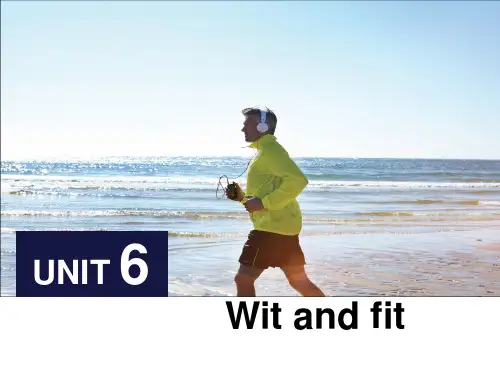新视野英语教程第三版unit6名师优质资料
- 格式:ppt
- 大小:318.50 KB
- 文档页数:6
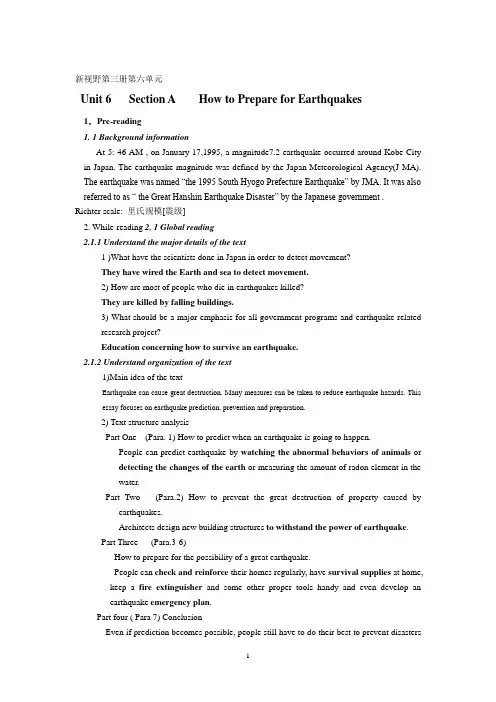
新视野第三册第六单元Unit 6 Section A How to Prepare for Earthquakes1.Pre-reading1. 1 Background informationAt 5: 46 AM , on January 17,1995, a magnitude7.2 earthquake occurred around Kobe City in Japan. The earthquake magnitude was defined by the Japan Meteorological Agency(J MA). The earthquake was named “the 1995 South Hyogo Prefecture Earthquake” by JMA. It was also referred to as “ the Great Hanshin Earthquake Disaster” by the Japanese government .Richter scale: 里氏规模[震级]2. While-reading 2. 1 Global reading2.1.1 Understand the major details of the text1 )What have the scientists done in Japan in order to detect movement?They have wired the Earth and sea to detect movement.2) How are most of people who die in earthquakes killed?They are killed by falling buildings.3) What should be a major emphasis for all government programs and earthquake-relatedresearch project?Education concerning how to survive an earthquake.2.1.2 Understand organization of the text1)Main idea of the textEarthquake can cause great destruction. Many measures can be taken to reduce earthquake hazards. This essay focuses on earthquake prediction, prevention and preparation.2) Text structure analysisPart One (Para. 1) How to predict when an earthquake is going to happen.People can predict earthquake by watching the abnormal behaviors of animals ordetecting the changes of the earth or measuring the amount of radon element in thewater.Part Two (Para.2) How to prevent the great destruction of property caused by earthquakes.Architects design new building structures to withstand the power of earthquake.Part Three (Para.3-6)How to prepare for the possibility of a great earthquake.People can check and reinforce their homes regularly, have survival supplies at home, keep a fire extinguisher and some other proper tools handy and even develop anearthquake emergency plan.Part four ( Para 7) ConclusionEven if prediction becomes possible, people still have to do their best to prevent disastersby improving building structures and by being personally prepared2. 2 Detail reading2. 2. 1 Words and phrases1) detect ( L.3 )在死者的胃里发现了少量的毒药。
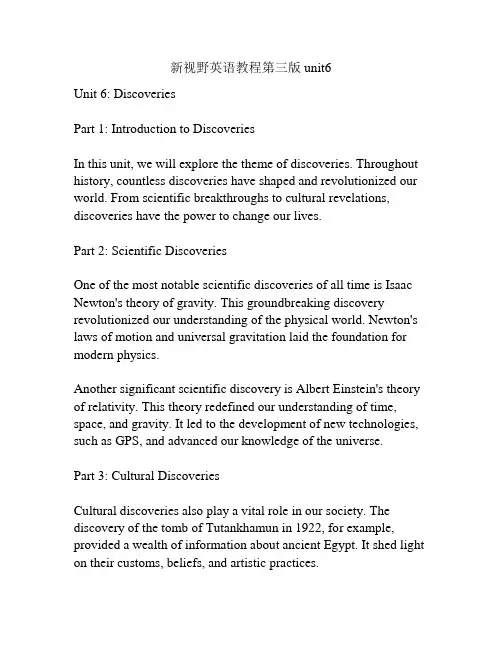
新视野英语教程第三版unit6Unit 6: DiscoveriesPart 1: Introduction to DiscoveriesIn this unit, we will explore the theme of discoveries. Throughout history, countless discoveries have shaped and revolutionized our world. From scientific breakthroughs to cultural revelations, discoveries have the power to change our lives.Part 2: Scientific DiscoveriesOne of the most notable scientific discoveries of all time is Isaac Newton's theory of gravity. This groundbreaking discovery revolutionized our understanding of the physical world. Newton's laws of motion and universal gravitation laid the foundation for modern physics.Another significant scientific discovery is Albert Einstein's theory of relativity. This theory redefined our understanding of time, space, and gravity. It led to the development of new technologies, such as GPS, and advanced our knowledge of the universe.Part 3: Cultural DiscoveriesCultural discoveries also play a vital role in our society. The discovery of the tomb of Tutankhamun in 1922, for example, provided a wealth of information about ancient Egypt. It shed light on their customs, beliefs, and artistic practices.Furthermore, the discovery of the Rosetta Stone allowed scholars to decipher ancient Egyptian hieroglyphs. This breakthrough opened up new avenues for studying ancient civilizations and understanding their languages.Part 4: Personal DiscoveriesNot all discoveries are grand in scale. Personal discoveries can be just as transformative. For instance, discovering a passion for painting or playing a musical instrument can bring immense joy and fulfillment to an individual. It allows them to express themselves creatively and discover hidden talents.In conclusion, discoveries, whether scientific, cultural, or personal, have the power to shape our world and transform our lives. They broaden our horizons and push the boundaries of human knowledge and understanding. Embracing the spirit of discovery can lead to remarkable achievements and personal growth.。
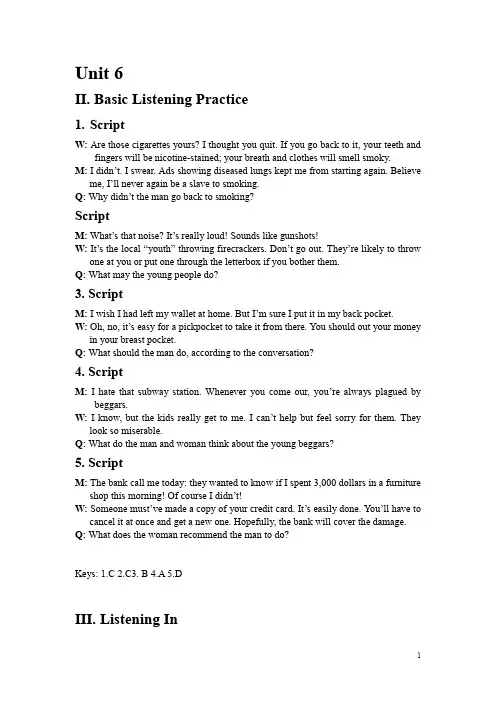
Unit 6II. Basic Listening Practice1.ScriptW: Are those cigarettes yours? I thought you quit. If you go back to it, your teeth and fingers will be nicotine-stained; your breath and clothes will smell smoky.M: I didn’t. I swear. Ads showing diseased lungs kept me from starting again. Believe me, I’ll never again be a slave to smoking.Q: Why didn’t the man go back to smoking?ScriptM: What’s that noise? It’s really loud! Sounds like gunshots!W: It’s the local “youth” throwing firecrackers. Don’t go out. They’re likely to throw one at you or put one through the letterbox if you bother them.Q: What may the young people do?3. ScriptM: I wish I had left my wallet at home. But I’m sure I put it in my back pocket.W: Oh, no, it’s easy for a pickpocket to take it from there. You should out your money in your breast pocket.Q: What should the man do, according to the conversation?4. ScriptM:I hate that subway station. Whenever you come our, you’re always plagued by beggars.W: I know, but the kids really get to me. I can’t help but feel sorry for them. They look so miserable.Q: What do the man and woman think about the young beggars?5. ScriptM: The bank call me today: they wanted to know if I spent 3,000 dollars in a furniture shop this morning! Of course I didn’t!W: Someone must’ve made a copy of your credit card. It’s easily done. You’ll have to cancel it at once and get a new one. Hopefully, the bank will cover the damage. Q: What does the woman recommend the man to do?Keys: 1.C 2.C3. B 4.A 5.DIII. Listening InTask 1: How to Solve Unemployment ProblemScriptAlan: I have a meeting with my accountant tomorrow morning. She’s preparing my income tax return, and I need to go over some of the receipts with her. Pamela:Income tax return! Don’t you think the government just squanders our hard-earned tax on some unnecessary projects?Alan: Sure, someone they do, but we are living pretty well and, to be honest, I don’t mind paying taxes. If I’m paying income tax, it means I’m earningwould be much lower.Pamela: If the poor would just get jobs, our taxes would be much lower.Alan: Most people would rather work than receive charity, but the situation is complex: sometimes there are no jobs that they are trained for.Pamela: Then they should take the needed training—upgrade their skills and knowledge to become more employable.Alan:Training and upgrading cost money. Some government tax dollars are directed to programs that help the poor get jobs.Pamela:But even when jobs are available, some of the unemployed don’t want to work. They would rather have a handout.Alan: It’s partly a matter of education. Some people have to be educated to realize how much fuller their life would be if they were not dependent oncharity.Pamela: I think the government should attack unemployment by reducing the tax rate.That would put more money into people’s pockets, then they would spendmore, and the spending would create more jobs for the poor.Alan:Many people would agree with you.Alan’s accountant is preparing his income tax return, so he needs to go over some of the receipts wit her. Pamela complains that the government just squanders people’s hard-earned tax money on some unnecessary projects. But Alan does not mind paying taxes, saying it means he is earning money, which is better than living on charity. Pamela insists that if the poor would just get jobs, taxes would bee much lower. Alan disagrees, saying most people would rather work than receive charity, but sometimes there are no jobs that they are trained for. But Pamela asserts that the jobless people should take the needed training to upgrade their skills and knowledge to become more employable. Alan believes that some of the government tax dollars are already directed to training and upgrading programs that help the poor to get jobs.When Pamela says some of the unemployed don’t want to work, preferring to have handouts, Alan points out that some people have to be educated to realize how much fuller their life would be if they ere not dependent on charity. Pamela is, however, more down-to-earth, thinking the government should attack unemployment by reducing the tax rate. That would give people more money; then, they would spend more, which would create more jobs for the poor.Task 2: A Professional GamblerScriptIn a bar a guy told the bartender, “I’m a professional gambler; I’ve made of lots of money from gambling.”The bartender answered, “I can hardly believe it. Your odds are fifty-fifty at best, right?”“Well, I only bet on sure things,” said the guy.“Like what?” asked the bartender.The bartender thought about it, “Okay,” he said.So the guy pulled out his false right eye and bit it, “Ah, you screwed me,” said the bartender, and paid the guy fifty dollars.“I’ll give you another chance. I’ll bet you another fifty dollars that I can bite my left eye,” said the stranger.The bartender thought it over again and said, “Well, I can see you’re not blind. I’ll take that bet.”So, the guy pulled out his false teeth and bit his left eye. And the bartender had to pay him another fifty dollars.Then the guy went to the back room to play cards with some of the locals. After many hours of drinking and card playing, he stumbles up to the bartender and said, “Bartender, I’ll give you one last chance. I’ll bet you 500 dollars that I can dump tomato juice into that whiskey bottle three foot away without spilling a drop.”The bartender thought the guy must be drunk now, “Okay, you’re on,” he said.The guy began dumping tomato juice all over the bartender, but no a drop fell into the whiskey bottle.The bartender was overjoyed. Laughing, the bartender said, “Hey, pal, you owe me five hundred dollars!”The guy said, “That’s okay. I just bet the guys in the card room1, 000 bucks each, that I could dump tomato juice all over you but you still laugh!”Keys: TFTFTFor Reference1.Because not a drop tomato juice fell into the whiskey bottle, and he was to win thebet of 500 dollars.2.Because he just bet the guys in card room1, 000 buck each that he could dumptomato juice all over the bartender and still make him laugh.Task3: Fighting Teen SmokingScriptThe percentage of teens who smoke cigarettes dropped to 28% in 2003, according to a report by the Center for Disease Control and Prevention. That was down from 36% in 1999 as measured by the Youth Risk Behavior Survey. It’s a triumph for many people across the nation who worked tirelessly to reverse the climb in teen smoking rates during the 1990s.An equal accomplishment many be discovery of what works to influence teens’motivation and behavior. Success has come in communities with a comprehensive program to fight tobacco use by teens. The best school health classes won’t have much effect on teen who already smoke. Many of them need professional help before they can quit. Another interesting finding is that nearly all first use of tobacco occurs before high school graduation. So if adolescents don’t start smoking by age 18, odds are they never will. For those who do experiment with cigarettes, new research shows teens can get hooked on nicotine more quickly than adults and by extremely low levels of tobacco.Now the bad news: while the teen smoking rate is down to 28%, that still means more than one in four teenagers still smoke. Public health and parents are not ready to abandon a quarter of today’s young people to the damaging effects of tobacco. Obviously, it is still too early to celebrate a complete victory. There is still much room for improvement.1.What percentage did the teen smoking rate drop by?2.What happened in the 1990s, according to the speaker? Useful for reducing teensmoking according to the speaker?3.What is especially useful for reducing teen smoking according to the speaker?4.What is the bad news mentioned in the passage?5.What is the main idea of the passage?Kes: 1D 2.A 3. B 4.C 5.For ReferenceBefore the age of 18. According to the passage, if adolescents don’t start smoking by age 18, odds are they never will.IV. Speaking OutMODEL 1 Nursing home abuse is a national epidemic. John: Nora, what are you doing? What are these notes about?Nora: Well, they are for a 1,000 word essay on abuse on the elderly, due Monday. John: That’s a big topic. What made you decide to write about that subject?Nora: G ranny’s going into a nursing home. And this essay is driving me crazy. John: Narrow down the topic. Pick one aspect, like nursing home. Do an outline. Nora: You mean list the ideas under headings: Introduction, Body, and the Conclusion?John: Yes. In the Introduction, say people live longer now, crowing nursing homes. Nora: Then maybe in the Body I can explain how the owners try to save money on food and care.John: Right. Here I see a good quotation: “Nursing home abuse is a national epidemic.”Nora:I have statistics: 500 homes inspected; in one-third, care was substandard. John:Mention government offices and lawyers who’ll help in cases of abuse. Nora: Then, I think I can summarize the main ideas about the helpless elderly in the Conclusion.John: Good. When you’ve written a first draft, read it aloud to eliminate awkward spots.Nora: I’m feeling a lot better about this essay and a lot less worried about Granny now.John: The essay is a piece of cake; but ensuring Granny’s OK is a lot harder.Now Y our TurnSAMPLE DIALOGA: Oh, Bobby, so you’ve come to see me again.B: How are you doing? Hope everyone is OK here.A: My God, I can hardly bear the life here. This nursing home is driving crazy.B: What’s wrong?>A: You see, there are to many old people here, but far too small a staff.B: Yeah, that’s probably because people live longer now, crowding nursing homes. A: So we can hardily get attention. The owner tries to save money on food and care. B: I see, nursing home abuse is now a very common problem. I heard of one survey with statistics: 300 homes were inspects, and in nearly half of them care was substandard.A: Sometimes they even beat me. I don’t know where and how I can get help.B: I n theory government offices and lawyers can help you in cases of abuse.A: But it is inconvenient for me to contact government offices again and again, and I’m too poor to hire a lawyer.B: OK, aunt, since it’s hard to ensure you’re Ok here, I’ll take you home. Mary and I will take care of you.A: Are you sure Mary thinks in the same way as you do?MODEL2 This beauty battled the bottle.Chris: Hey Nora.Nora: Hey Chris. How is it going?Chris:Not too bad. Sit down. Sit down. Hey, who was that food-looking girl you were talking to near the auditorium?Nora: “The Drunken Doctor”, Dr Doyle, who gave dynamite Ladies Only lecture. Chris: No, no. I mean the blonds, healthy-looking, the twenty-something girl in blue. Nora: Yeah, exactly. She’s a doctor, but she used to be a drunk. Now she tells women the dangers of drinking.Chris:I can’t imagine some one as pretty as she is to be a drunk. And a doctor, too! Nora: She says there are alcoholics all over the world, 16 million plus just in the U.S. Chris: I’m surprised that there are so many people who lack the will-power to stop. Nora: It’s a disease that strikes young and old, rich and poor, and al walks of life. Chris: Drunks are often dirty old men begging for money. How did Dr. Doyle get hooked?Nora: She was an intern in a big hospital: long hours, little sleep, and constant stress.Chris: I suppose at first alcohol helped her to relax, but she realized.Nora: First it was a drink at night, then two, then a bottle, then drinks to wake up. Chris: That’s a sad story.Nora: More inspiring than sad. She got help and stopped. Now she helps others. Isn’t that wonderful?Now Y our TurnSAMPLE DIALOGA: Hi, John, I’m so glad to see you are back!B: It’s nice to be home again, Mom.A: Oh, you smell terribly of alcohol and tobacco. You didn’t smoke or drink before you left home a year ago. How did you get hooked?B: As an assistant engineer, I had to work might shifts often. I felt lonely and began to drink and smoke. That helped me to relax.A: So gradually you drank more and more?B: Yeah, first it was a drink at night, then two, then a bottle, and then I drank to wake up.A: Oh, I simply can’t imagine my handsome son to be a drunk and a heavy smoker now. Can’t you stop?B: It’s difficult. I lack the will-power to stop.A: But remember the dangers of heavy drinking and smoking. Sooner or later you’ll develop high blood pressure, heart trouble, or liver trouble.B: There are alcoholics all over the world, and they are still living.A:I’m sorry that drinking and smoking ate diseases that strike young and old, rich and [poor, and all walks of life. Young must get help and stop.B: OK, I’ll try my best.MODEL3 There are high risks with games of chance.ScriptSusan: Hey, Chris. Why so you look so depressed?Chris: Oh, it’s my brother. You know, he has got a gambling problem. You can’t understand gambling as an addiction unless you’ve been hooked.Susan: Apparently it’s like being addicted to drugs or alcohol. You just want more and more.Chris: It’s exactly like alcoholism; it takes over you life. It’s on your mind constantly. Susan: Yeah, like some horrible disease. But you can get help.Chris: My brother tried to stop, but he felt restless…bad tempered. His nerves were always on edge.Susan: Did he try Gamblers Anonymous? It’s a self-help group with experience just like his.Chris: Yeah, he’s not alone. It’s estimated there are 10 million addicts in America. Susan: I don’t want to nag him, but isn’t it a question of taking control of his life? Chris: I see your point, but he’s a compulsive gambler.Susan: I know. But if he gets help, maybe he’ll get better.Chris: No doubt. It’ll be tough. Though but worth it.Susan: Remember the proverb “Better medicine has wholesome effects.”Now Your TurnSAMPLE DIALOGA: Good morning, Mr. Brown, I’m a correspondent with the magazine Health. I heat you’ve overcome your gambling problem. First of all, could you describe your problems in the past?B: Yeah, I did have serious gambling problems. You can’t understand gambling as an addiction till you’ve been hooked.A: Could you tell me your feeling at the time?B: There was a sensation like the one that comes with drugs or alcohol, and I wanted more and more.A: How do you compare it with alcoholism?B: It’s like alcoholism; it takes over your life. It’s on your mind constantly.A: Did you try to get help?B: At first I didn’t. I tried to stop on my own, but I felt restless and bad-tempered. My nerves were on edge.A: I see it’s difficult for a compulsive gambler to overcome the problem. But how did you finally get rid of it?B: I went to a doctor for help. He made me realize that it was a question of getting hold of my life. He told me that if I thought of it as a disease, I would probably be cured. He also gave me some medicine.A: I guess it was a thought fight.B: Yes, though but worth it. Anyway, “Bitter pills may have wholesome effects.”V. Let’s TalkScriptToday I’ll be presenting a report on our findings on the condition of the world’s population. It may be a surprise to you that half the people in the world live on less than two dollars a day, and one billion people live on less than one dollar a day.I’m going to look at poverty and its relationship to population issues. We must work fast if we hope to reduce poverty by half, by the year 2015.Our survey shows that the first step should be to improve health-care systems. In the world’ poorest countries, people are expected to live just 49 years. One in ten children doesn’t reach his or her first birthday. According to our study, poor health and poverty are linked. Women are affected most by poor-care systems, especially pregnant women.The second job we have to do, as many of you can guess, is to reduce birth rates. We have found that when given a choice, poor people in developing countries have fewer children than their parents dis. A possible reason for this is probably that smaller families have fewer expenses and more chances of increasing their earnings and savings.Since the 1970s, developing countries with lower birth rates have had faster economic growth. They have had higher productivity, more savings and more investment.Obviously we must encourage family planning and lower birth rates.Now, here is the third measure we must take: promote education in developing countries. Investing in education, especially for women, can reduce poverty. Educated women have more opportunities to work and a chance to live better. Moreover, they tend to send their children to food schools so that they can climb the social ladder. Well, any questions? None? OK. Now I’ll talk about the fourth step we need to take…DiscussionSAMPLEA:To reduce poverty, it is very important to lower birth rates, as the speaker suggested in his lecture.B:True. Smaller families have fewer expenses and more chances to increase their earning and savings.A:Moreover, developing countries with lower birth rates have had faster economicgrowth.B: It’s equally important to popularize education.A: Yes, investing in education, especially for women, can reduce poverty. Educated women, you know, have more opportunities to work and a chance to live better. B: Moreover, they tend to send their children to food school s so that they will climb the social ladder.A: The speaker also mentions the necessity to improve the health-care system. In fact, poor health and poverty are linked.B: I agree. If you are not in good health, you can’t work well to get good pay. What’s more, you have to spend lots of money on seeing doctors.A: Some countries are economically backward, so they try to develop a powerful tourism industry, and in this way they earn a lot of money.B: I think it is more important for them to develop their national economy. With fast economic growth, many people will shake off poverty.A: Poverty can be alleviated further by economic aid from rich countries.B: But I think technological aid from advanced countries can be more significant.With better technology, poor countries can develop faster on their on,. As the Chinese saying goes, it is better to teach someone how to fish than to give him fish.A: If less developed countries are allowed to export more of their workforce, they can earn more foreign currency.B: This requires developed nations to lower their tariff barriers.VI. Further Listening and SpeakingTask1: Held Back Because I Speak SpanishScriptI was raised speaking English, but I also spoke Spanish at home. When I went to school for the first time, I was enrolled in ESL classes—classes of English as a Second Language. I was also put in the Limited English Proficiency Program. In all these classes, I always got the highest grades. I was the best reader and speaker. There as no reason for me to be in any of those classes.When my parents discovered that I was in those classes instead of in regular classes with other English-speaking students, they went to the school administration to complain about the discrimination. The school had nothing to say. My parents tried to get me out of the ESL classes, but the school fought it very hard to keep me there. And then we found out why—for every student the school had in the ESL and Limited English Proficiency Program, they would receive$400. This was pretty devastating. The school’s only excuse for keeping me there was because I lived in aSpanish-speaking household, and that I was influenced by the way my parents spoke. My parents were outraged, but I remained in the ESL and Limited English Proficiency Program until I was in the fifth grade.Then parents transferred me to another school where they had friends. The new school gave me an English proficiency test. I aced it. SO I didn’t have to attend those programs for non-native English speakers. I was finally on the right track and back at the head of the class. The first school I had would have never let me out of those programs or even let me take the test. I was too “Spanish” for tem.1.What kind of class does the speaker think he should attend?2.What was the real reason the speaker was placed in a Limited English Proficiencyclass?3.What was the excuse the school used to put the speaker in an ESL class?4.How did the speaker perform in the regular English class?5.When the speaker described his first school, what were his feeling?Keys: 1.C 2.D 3.A 4.B 5.ATask 2: Drinking, Gambling and GolfScriptA man was walking in the city when he was accosted by a particularly dirty-looking bum, who asked him for a couple of dollars for dinner.The man took out his wallet, extracted two dollars and asked, “If I give you this money, will you take it and buy whiskey?”“No, I stopped drinking years ago,” the bum said.“Will you use it to gamble?”“I don’t gamble. I need everything I can get just to stay alive?”“Will you spend the money on green fees at a golf course?””Are you nuts? I haven’t played golf for 20 years!”The mad said, “Well, I’m not going to give you two dollars. Instead, I’m going to take you to my home for a terrific dinner cooked by my wife.”The bum was surprised, “Won’t your wife be furious with you for doing that? I know I ‘m dirty, and I probably smell pretty bad.”The man replied, “That’s OK. I just want her to see what a man looks like who’d given up drinking, gambling, and golf.”Task3: Why buy lottery tickets?ScriptCharles: Did you hear? Next week’s lottery will be 28 million dollars! You got your ticket yet?Joan:I didn’t buy lottery tickets, and I don’t gamble on other ways, either.Lottery tickets ate just another way of taxing the poor.Charles: What do you mean by that?Joan:Many of the big spenders on lottery tickets ate poor. They are spending money they can’t afford to spend.Charles: I just buy lottery tickets for fun. You know…the first prize is a huge amount, and if would be exciting.Joan: But you don’t need the money to enjoy life, so for you it’s a game. But when the poor buy lottery tickets, it is often out of desperation.Charles: You must be right. Casinos are opening everywhere, and many people go on gambling holiday—you can even take a gambling cruise.Joan:Imagine being on an ocean cruise and spending all your time indoors bent over a card table or a roulette wheel.Charles:Maybe there should be some programs to help people overcome their gambling addictions something similar to Alcoholics Anonymous.Joan:There’s indeed an online program that can help. But nobody can force gamblers to join it. They must first want to be cured themselves.For Reference1.She thinks many (of the) big spenders on lottery are poor, spending money theycan’t afford to spend.2.He just buys lottery tickets foe fun. He thinks if he won a huge amount, it wouldbe exciting.3.They buy lottery tickets out of desperation. And the thrill of a win, of somethingfor nothing, is addictive.4.Casinos are opening everywhere, many people go on gambling holidays, and onecan even take a gambling cruise.5.It will be helpful to habitual gamblers only when they want to be curedthemselves.News ReportHumanity is indivisible.ScriptKofi Annan, Secretary-General of the United Nations:Peace must be sought above all because it is a condition for every member of the human family to live a life of dignity and security.We have entered the third millennium through a gate of fire. If today, after the horror of 11 September, we see better and we see farther, we will realize that humanity is indivisible.New threats make no distinction between races, nations, or regions. A new insecurity has entered every mind, regardless of wealth or status. A deeper awareness of the bonds that bind us all, in pain and in prosperity, has gripped young and old…because beneath the surface of state and nations, ideas and language, lies the fate of individual human beings in needed. Answering their needs will be the mission of the United Nations in the century to come. Thank you very much.。
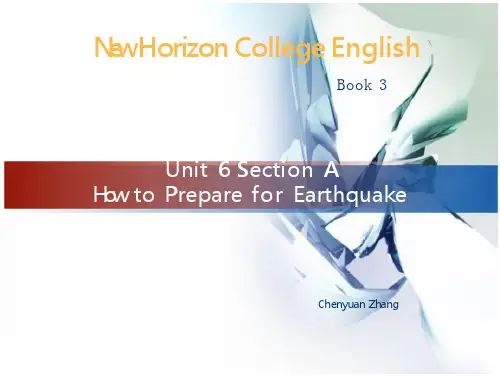
![新视野英语教程第三版unit6 Celebration of Holidays[优质ppt]](https://uimg.taocdn.com/7fa04687fab069dc5122014e.webp)

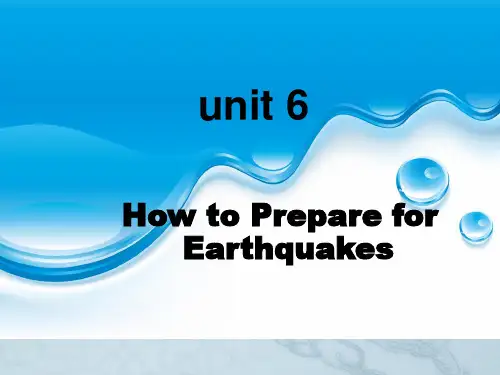
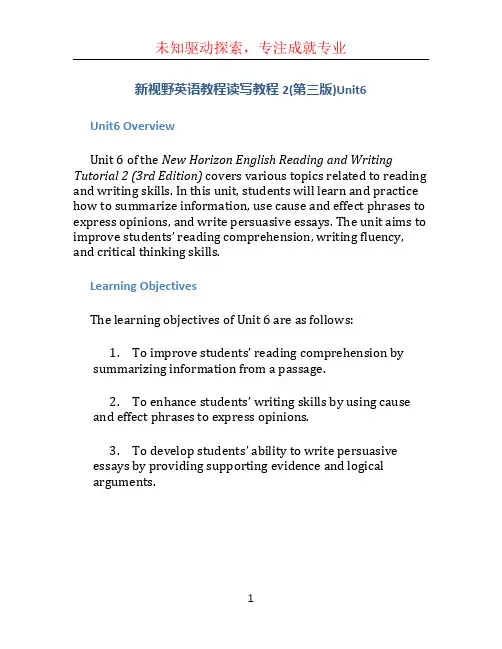
新视野英语教程读写教程2(第三版)Unit6 Unit6 OverviewUnit 6 of the New Horizon English Reading and Writing Tutorial 2 (3rd Edition) covers various topics related to reading and writing skills. In this unit, students will learn and practice how to summarize information, use cause and effect phrases to express opinions, and write persuasive essays. The unit aims to improve students’ reading comprehension, writing fluency, and critical thinking skills.Learning ObjectivesThe learning objectives of Unit 6 are as follows:1.To improve students’ reading comprehension bysummarizing information from a passage.2.To enhance students’ writing skills by using causeand effect phrases to express opinions.3.To develop students’ ability to write persuasiveessays by providing supporting evidence and logicalarguments.Lesson 1: Summarizing InformationLesson Objectives•Understand the importance of summarizing information.•Identify main ideas and supporting details in a passage.•Practice summarizing information effectively.Lesson Activities1.Introduction to summarizing information.2.Reading and analyzing a passage.3.Identifying main ideas and supporting details.4.Summarizing the information in the passage.Lesson Summary and ResourcesIn Lesson 1, students will learn how to summarize information effectively. They will be introduced to the concept of summarization and its importance in understanding a passage. The students will practice reading a passage and identifying main ideas and supporting details. With these skills, they will be able to accurately summarize the information in their own words.The resources for Lesson 1 include a passage for practice and additional reading materials for further practice.Lesson 2: Using Cause and Effect PhrasesLesson Objectives•Understand the use of cause and effect phrases.•Identify cause and effect relationships in a passage.•Practice expressing opinions using cause and effect phrases.Lesson Activities1.Introduction to cause and effect phrases.2.Reading and analyzing a passage.3.Identifying cause and effect relationships.4.Writing sentences expressing opinions using causeand effect phrases.Lesson Summary and ResourcesLesson 2 focuses on the use of cause and effect phrases to express opinions. Students will learn various cause and effect phrases and their meanings. They will practice identifying cause and effect relationships in a passage. Through thispractice, they will be able to express their opinions effectively using cause and effect phrases.The resources for Lesson 2 include a passage for practice and additional worksheets for further practice.Lesson 3: Writing Persuasive EssaysLesson Objectives•Understand the structure and components of a persuasive essay.•Develop skills in providing supporting evidence and logical arguments.•Practice writing persuasive essays.Lesson Activities1.Introduction to persuasive essays.2.Analyzing the structure and components of apersuasive essay.3.Writing a persuasive essay with supportingevidence and logical arguments.4.Peer review and editing of persuasive essays.Lesson Summary and ResourcesIn Lesson 3, students will learn how to write persuasive essays. They will be introduced to the structure and components of a persuasive essay, including the introduction, body paragraphs, and conclusion. The students will learn how to provide supporting evidence and logical arguments to persuade the reader. They will practice writing persuasive essays and receive feedback through peer review and editing.The resources for Lesson 3 include sample persuasive essays, writing prompts, and peer review guidelines.ConclusionUnit 6 of the New Horizon English Reading and Writing Tutorial 2 (3rd Edition) provides students with valuable skills in reading comprehension and writing. By learning how to effectively summarize information, use cause and effect phrases, and write persuasive essays, students can become more proficient in their English reading and writing abilities. With continued practice and application of these skills, students will be well-prepared for their English language development.。
![新视野英语教程第三版unit6 Celebration of Holidays[优质ppt]](https://uimg.taocdn.com/7fa04687fab069dc5122014e.webp)
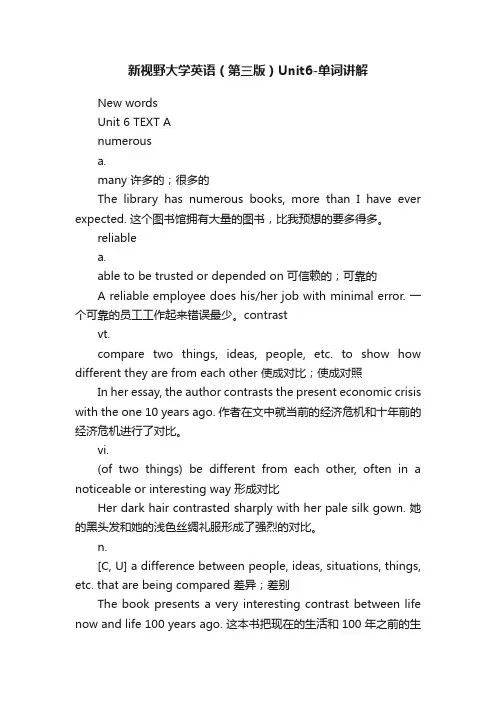
新视野大学英语(第三版)Unit6-单词讲解New wordsUnit 6 TEXT Anumerousa.many 许多的;很多的The library has numerous books, more than I have ever expected. 这个图书馆拥有大量的图书,比我预想的要多得多。
reliablea.able to be trusted or depended on 可信赖的;可靠的A reliable employee does his/her job with minimal error. 一个可靠的员工工作起来错误最少。
contrastvt.compare two things, ideas, people, etc. to show how different they are from each other 使成对比;使成对照In her essay, the author contrasts the present economic crisis with the one 10 years ago. 作者在文中就当前的经济危机和十年前的经济危机进行了对比。
vi.(of two things) be different from each other, often in a noticeable or interesting way 形成对比Her dark hair contrasted sharply with her pale silk gown. 她的黑头发和她的浅色丝绸礼服形成了强烈的对比。
n.[C, U] a difference between people, ideas, situations, things, etc. that are being compared 差异;差别The book presents a very interesting contrast between life now and life 100 years ago. 这本书把现在的生活和100 年之前的生活进行了十分有趣的对比。
